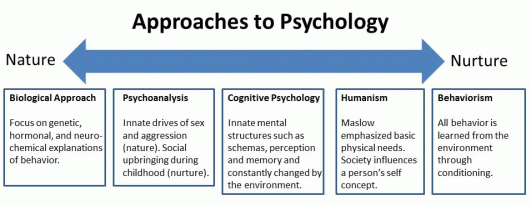The nature vs nurture debate in psychology is concerned with the extent to which behaviours, traits and personality are inherited (ie genetic) or acquired (ie learned). Accordingly, when psychologists say that a given trait is due more to nature than nurture, they mean that the particular trait is more a product of genes than social or environmental factors.
It has long been accepted that certain physical characteristics are determined by genes (for example, eye colour, skin pigmentation and certain diseases), and that other characteristics are strongly influenced by genes (for example, height, weight, and vulnerability to specific diseases). This has led to speculation that psychological characteristics may also be genetically determined or influenced. It is a topic which has been much debated, with the stance taken by psychologists varying greatly. The diagram below gives a good summary of the different approaches.

In recent years, many psychologists have recognised that both nature and nurture play an important role in the development of traits and personality. Accordingly, some modern psychologists now consider the nature vs nurture question naive and outdated. The psychologist Donald Hebb famously once responded to a journalist's question of "which, nature or nurture, contributes more to personality?" by asking, "which contributes more to the area of a rectangle, its length or its width?"
